

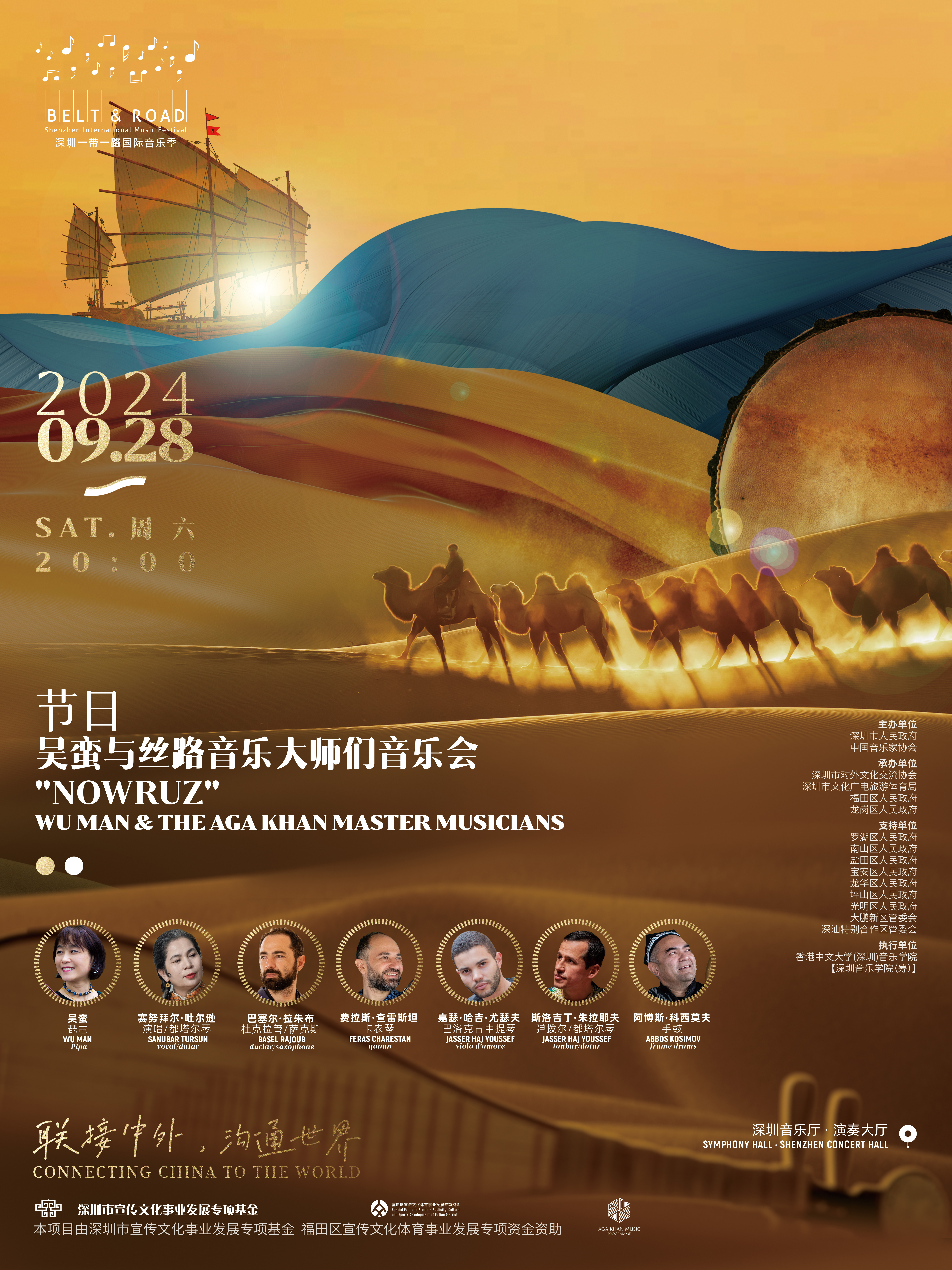
2024深圳“一带一路”国际音乐季
2024 Shenzhen "Belt & Road" International Music Festival
节日-吴蛮与丝路音乐大师们音乐会
"Nowruz" - Wu Man & The Aga Khan Master Musicians
演出时间 Date&Time
9月28日(周六)20:00
Sept. 28 (Sat.) 8 PM
演出地点 Venue
深圳音乐厅·演奏大厅
Symphony Hall, Shenzhen Concert Hall
演出曲目 Programme
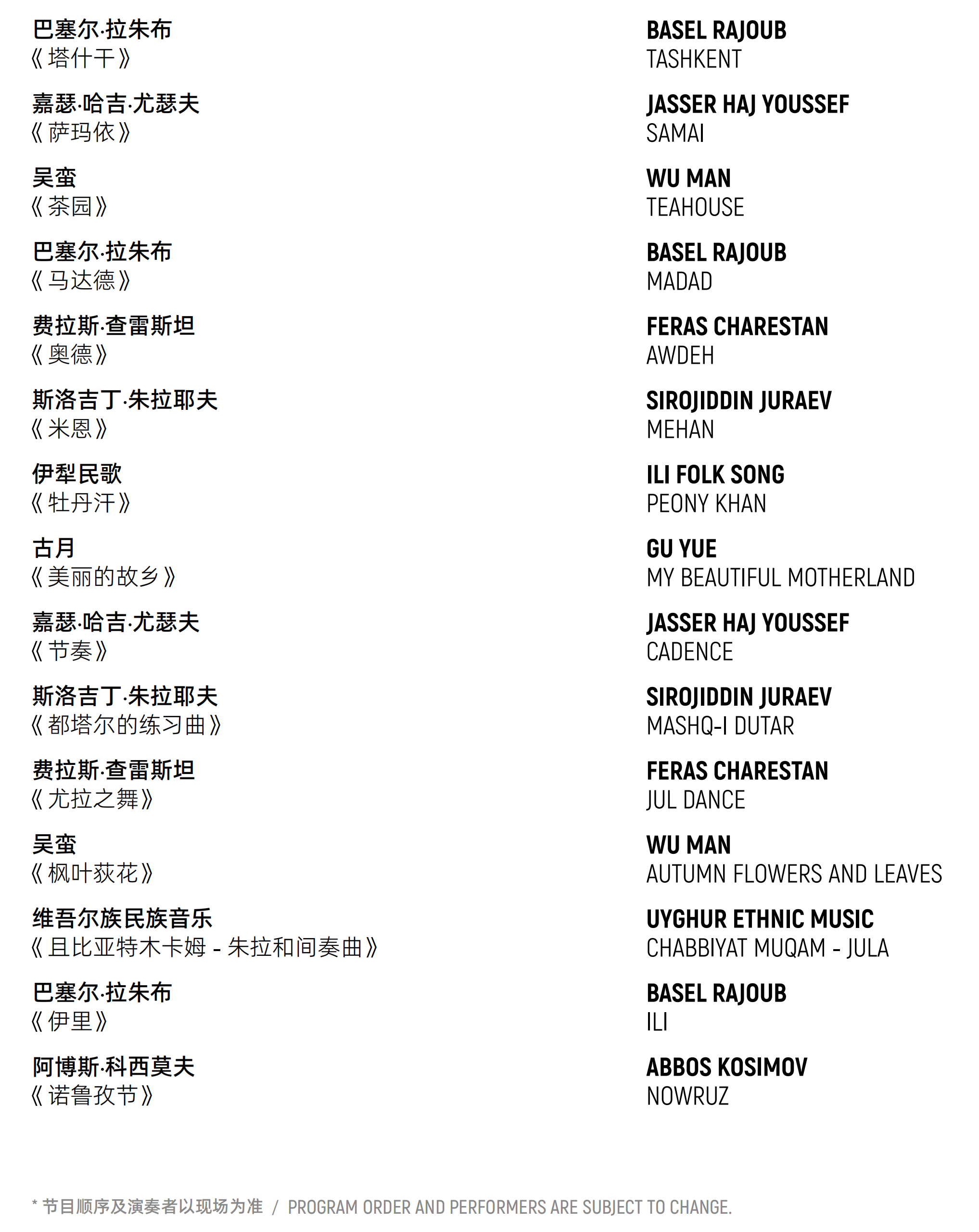
演出阵容
Artist Lineup

吴蛮 Wu Man
琵琶 Pipa
Wu Man belongs to a rare group of musicians who have redefined the role of their instruments, in her case, the pipa, a pear-shaped, four-stringed Chinese lute with a rich history spanning centuries. She is celebrated as one of the most prominent instrumentalists of traditional Chinese music, as well as a composer and educator. She has premiered hundreds of new works for the pipa, and has performed in recital and with major orchestras around the world. She is a frequent collaborator with ensembles such as the Kronos and Shanghai Quartets and The Knights, and is a founding member of the Silkroad Ensemble. She has appeared in more than 40 recordings throughout her career, including the Silkroad Ensemble’s Grammy Award-winning recording Sing Me Home, featuring her composition “Green (Vincent’s Tune).” She is also a featured artist in the 2015 Emmy Award-winning documentary The Music of Strangers: Yo-Yo Ma and the Silk Road Ensemble.
Born in Hangzhou, China, Wu Man studied at the Central Conservatory of Music in Beijing, where she became the first recipient of a master's degree in pipa. At age 13, she was recognized as a child prodigy and a national role model for young pipa players. Ms. Wu is a recipient of the 2023 National Heritage Fellowship from the National Endowment of the Arts (NEA), one of the United States’ most prestigious honors in folk and traditional arts. In 2023 she was additionally honored with the Asia Society’s Asia Arts Game Changers Award, an annual award presented in New York City honoring artists and arts professionals for their significant contributions to contemporary art. She is a Visiting Professor at her alma mater the Central Conservatory of Music in Beijing and a Distinguished Professor at the Zhejiang and the Xi'an Conservatories. In 2021 she received an honorary Doctorate of Music from the New England Conservatory of Music. She has also served as Artistic Director of the Xi’an Silk Road Music Festival at the Xi'an Conservatory.

赛努拜尔·吐尔逊 Sanubar Tursun
演唱、都塔尔琴 Vocal/Dutar
Sanubar Tursun was born into a family of artists in Yili, Xinjiang. From a young age, she began studying the Muqam, folk songs, and instruments such as the dutar and yangqin under her father's guidance.
She graduated from the Music Department of Xinjiang Arts University, where she studied yangqin under Professor Jamila. Following her studies, she worked with Xinjiang Muqam Art Troupe and Xinjiang Bayi Steel Art Troupe. In 1993, as a specialist in yangqin performance, she won third prize in the youth category at the National Ethnic Instrumental Music Nanjing Invitational Competition. In 2003, she was invited as a folk singer to perform at the Western Song King Competition held at the Music Hall of Beijing Zhongshan Park.
From 2010 to 2016, she pursued advanced studies in composition at Shanghai Conservatory of Music under the tutelage of Professor Ye Guohui. Between 1992 and 2013, Sanubar released 10 solo albums and composed over 100 songs, making her a household name in Xinjiang. In 2011, she gained further recognition through her collaboration with internationally renowned pipa player Wu Man on the globally released album Wu Man and Master Musicians from the Silk Road, and was invited to perform concerts in cities and countries such as London, Paris, Venice, Edinburgh, Boston, Toronto, Switzerland, Belgium, Japan, and Singapore. In 2015, she and her family were invited to perform at the "Sanubar Tursun Family Ensemble" concert at Shanghai Grand Theatre during the World Music Shanghai. She also appeared as a guest on Shanghai Media Group (SMG)'s program Tonight, We Listen to Music, where she introduced traditional Uyghur music. In 2016, she participated in the Chinese National and Folk Music Week at the Central Conservatory of Music and the "Dialogue between Pipa and the World's Plucked String Instruments" symposium at the Shanghai Conservatory of Music, which included music from China, the United States, and East Africa. In 2017, as a guest singer, Sanubar joined the national tour of Wu Man and the Master Musicians from the Silk Road, performing in venues such as Xi'an Concert Hall, Suzhou Bay Grand Theatre, Changzhou Grand Theatre, Zhuji Grand Theatre, Henan Art Center, Shanxi Grand Theatre (Taiyuan), Shengjing Grand Theatre, Beijing Tianqiao Performing Arts Center, Tangshan Grand Theater, Weifang Grand Theatre, Qingdao Grand Theatre, and Wuhan Qintai Grand Theatre, where she introduced traditional Xinjiang music to audiences, receiving enthusiastic response.
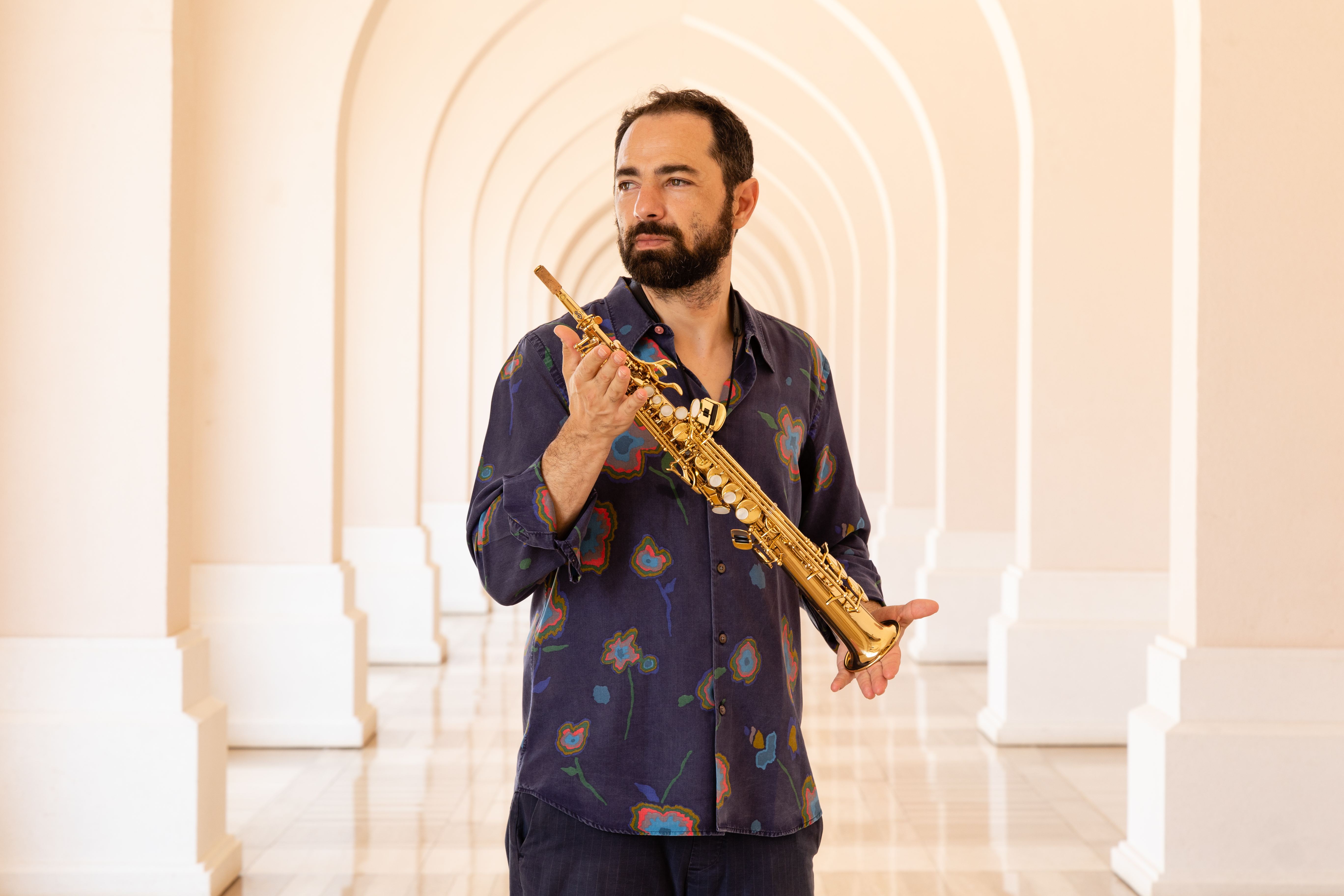
巴塞尔·拉朱布 Basel Rajoub
杜克拉管/萨克斯 Duclar/Saxophone
Basel Rajoub is a composer and saxophonist who has honed both a distinctive sound and an original musical language for the saxophone inspired by the rich melodic and rhythmic vocabulary of the Middle East. Born in Aleppo, Syria, Rajoub graduated from the Damascus High Institute of Music, where he majored in trumpet. Later, he taught himself to play the saxophone and began composing for the various ensembles in which he has performed. His compositions draw on the characteristic microtonal intervals of Middle Eastern music to illuminate a panoramic emotional world that extends from prayer to dance. A resident of Geneva, Switzerland, Rajoub serves as Artistic Director of the Oriental Orchestra at Haute école de musique Genève.
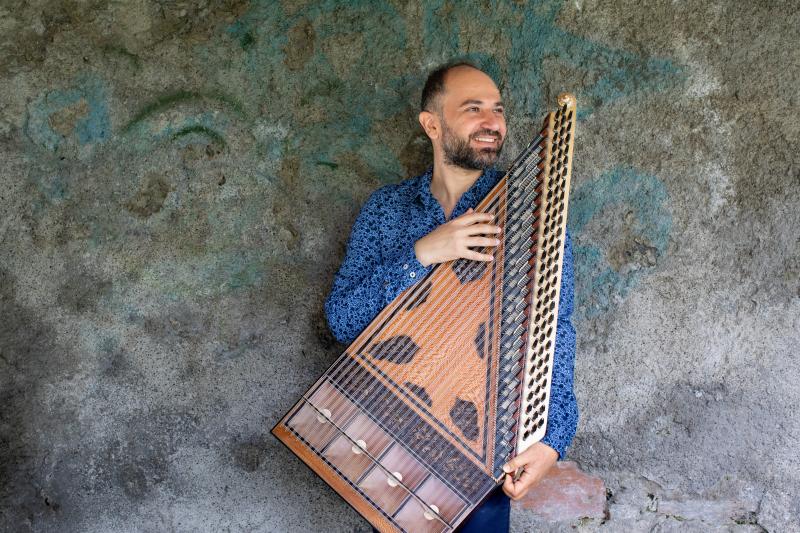
费拉斯·查雷斯坦 Feras Charestan
卡农琴 Qanun
Feras Charestan has devoted his musical career to the art of the qanun and developed a unique performance style on this ancient and ubiquitous instrument of the Middle East and Mediterranean Basin. Born in Al-Hasakeh, in the northeast of Syria, Charestan studied qanun at the High Institute of Music in Damascus and quickly became a sought-after soloist with symphony orchestras as well as a member of popular bands and contemporary music ensembles. It was only after relocating to Stockholm, Sweden, that Charestan began composing his own music, which blends Middle Eastern melodic modes and genres with elements of a European sensibility in a musical style that is very much his own.
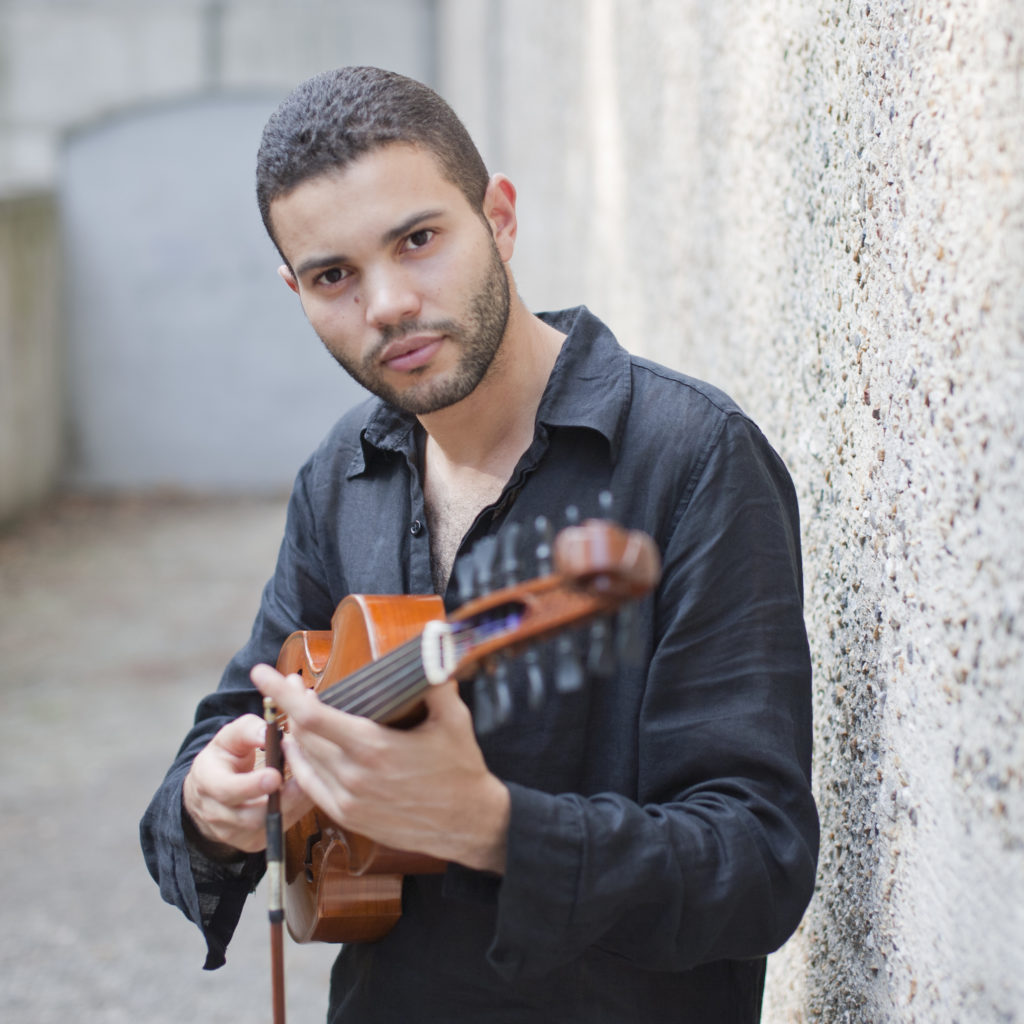
嘉瑟·哈吉·尤瑟夫 Jasser Haj Youssef
巴洛克古中提琴 Viola d’amore
Jasser Haj Youssef was born in Monastir, Tunisia and studied both classical European music and classical Arabic music (maqām) from an early age. His first instrument was the violin. Later he began playing the Baroque viola d’amore, which has sympathetic string that are not bowed, but create a rich, resonant sound. Haj Youssef’s professional career has merged his interests and talents in the improvisatory art of maqām, classical chamber and orchestral music, jazz, and world music. He currently resides in Paris, where he is active as a performer, composer, teacher, and jury member for international competitions. He has composed works for the Paris Chamber Orchestra, the early music group Les Musiciens du Louvre, and many others.

斯洛吉丁·朱拉耶夫 Sirojiddin Juraev
坦布尔琴/都塔尔琴 Tanbur/Dutar
Sirojiddin Juraev grew up in the bilingual Tajik-Uzbek cultural milieu of northern Tajikistan, where he learned to play the two-stringed dutar at a young age and subsequently, the tanbur and sato. His music education blended two paths: traditional master-disciple oral transmission and conservatory-style studies rooted in music notation and theory. Juraev began composing while still a student. “One day I played a melody that had just come into my head, as if I’d heard it in a dream,” Juraev recalled. “I asked my teacher whether he had heard that melody before, and he said no, he was hearing it for the first time. Later I made up other melodies and people really liked them.They told me that I was a composer.”
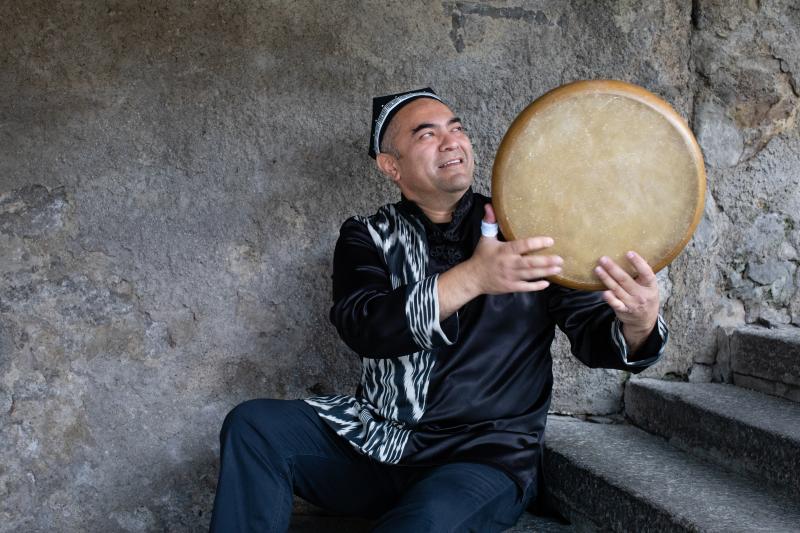
阿博斯·科西莫夫 Abbos Kosimov
手鼓 Frame drums
Abbos Kosimov was born in Tashkent, Uzbekistan, into a musical family. A disciple of the honored Uzbek doira player Tuychi Inogomov and winner of the Competition of Percussion Instruments of Central Asia and Kazakhstan, Kosimov established his own doira school in 1994 and his ensemble, Abbos, in 1998. Kosimov performs interna- tionally with Zakir Hussain and Randy Gloss’s percussion group Hand’s OnSemble and recorded with Stevie Wonder. Kosimov has composed many works for his Abbos Ensemble and, after joining AKMM, began to expand his compositional oeuvre to other combinations of instruments. “Nowruz,” the title track of the present album, is his first composition for AKMM.
